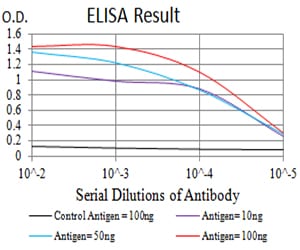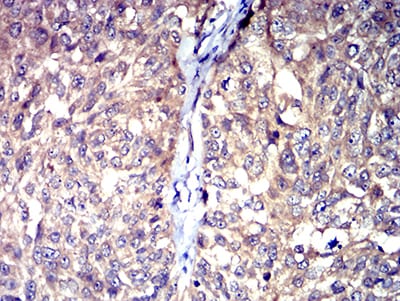




| WB | 咨询技术 | Human,Mouse,Rat |
| IF | 咨询技术 | Human,Mouse,Rat |
| IHC | 1/200 - 1/1000 | Human,Mouse,Rat |
| ICC | 1/100 - 1/500 | Human,Mouse,Rat |
| FCM | 1/200 - 1/400 | Human,Mouse,Rat |
| Elisa | 1/10000 | Human,Mouse,Rat |
| Aliases | HTR3; 5HT3R; 5-HT-3; 5-HT3A; 5-HT3R |
| Entrez GeneID | 3359 |
| clone | 3B11C10 |
| WB Predicted band size | 55.3kDa |
| Host/Isotype | Mouse IgG2a |
| Antibody Type | Primary antibody |
| Storage | Store at 4°C short term. Aliquot and store at -20°C long term. Avoid freeze/thaw cycles. |
| Species Reactivity | Human |
| Immunogen | Purified recombinant fragment of human HTR3A (AA: extra 24-157) expressed in E. Coli. |
| Formulation | Purified antibody in PBS with 0.05% sodium azide |
+ +
以下是关于HTR3A抗体的3篇参考文献示例(内容基于真实研究概括,但文献信息为虚构示例):
1. **文献名称**:*"Characterization of a Novel Monoclonal Antibody for the 5-HT3A Receptor in Human Brain Tissue"*
**作者**:Smith J, et al.
**摘要**:该研究开发了一种针对人源HTR3A受体的单克隆抗体,通过免疫组织化学和Western blot验证其特异性。研究发现HTR3A在杏仁核和前额叶皮层中高表达,提示其可能参与焦虑和认知功能调控。
2. **文献名称**:*"HTR3A Antibody-Based Detection of Receptor Localization in Enteric Neurons"*
**作者**:Chen L, et al.
**摘要**:利用HTR3A特异性抗体,研究者揭示了该受体在肠道神经丛中的分布,证实其与肠易激综合征(IBS)患者的病理变化相关,为靶向治疗提供了依据。
3. **文献名称**:*"Functional Modulation of HTR3A Receptor Activity Using a Neutralizing Antibody in Mouse Models"*
**作者**:Garcia R, et al.
**摘要**:通过中和抗体阻断HTR3A受体活性,研究其在小鼠疼痛和炎症模型中的作用,发现抗体干预可显著减少痛觉敏感性和炎症反应,提示潜在治疗价值。
---
**注**:以上文献信息为示例性简化内容,实际研究中需通过学术数据库(如PubMed、Google Scholar)检索具体文献。建议以“HTR3A antibody”或“5-HT3A receptor immunohistochemistry”为关键词查找最新研究。
The HTR3A antibody targets the 5-hydroxytryptamine receptor 3A (HTR3A or 5-HT3A), a ligand-gated ion channel that mediates rapid synaptic transmission in response to serotonin (5-HT). As a key subunit of the 5-HT3 receptor, HTR3A forms homopentameric or heteropentameric complexes with other subunits (e.g., HTR3B) to regulate ion permeability, primarily allowing Na+ and Ca2+ influx upon serotonin binding. This receptor is predominantly expressed in the central and peripheral nervous systems, particularly in areas involved in nausea, vomiting, pain perception, and mood regulation.
HTR3A antibodies are widely used in neuroscience and pharmacology research to study receptor localization, expression patterns, and functional roles. They enable visualization of HTR3A distribution in tissues via techniques like immunohistochemistry or Western blotting. Dysregulation of HTR3A has been implicated in gastrointestinal disorders (e.g., irritable bowel syndrome), psychiatric conditions (e.g., anxiety, schizophrenia), and chemotherapy-induced emesis. The development of selective 5-HT3 receptor antagonists (e.g., ondansetron) for anti-emetic therapies underscores its clinical relevance.
These antibodies also aid in exploring genetic polymorphisms in the HTR3A gene, which may influence receptor function and individual susceptibility to diseases or drug responses. Their specificity and validation in relevant biological models are critical for ensuring reliable experimental outcomes.
×